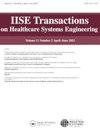Virtual reality based hybrid simulation for functional endoscopic sinus surgery
IF 1.5
Q3 HEALTH CARE SCIENCES & SERVICES
IISE Transactions on Healthcare Systems Engineering
Pub Date : 2020-04-02
DOI:10.1080/24725579.2019.1692263
引用次数: 9
Abstract
Abstract Advances in Virtual Reality (VR) technology warrants the improvement of the training system to replicate surgical procedures. The VR-based training system has proved to be useful for surgical training by decreasing operative time and increasing patient safety. For example, Functional Endoscopic Sinus Surgery (FESS) is challenging due to the confined operating space surrounded by critical structures such as the eye, brain, and major blood vessels. Image-guided surgery in FESS enables the use of real-time navigation of surgical instruments to preoperative imaging. This paper demonstrates the development of a surgical simulator which facilitates trainees in three-fold. First, the identification and segmentation of critical structures in head and neck become achievable through the VR-based simulator. Second, the simulator supports to rehearse the surgical steps on a model of patient-specific anatomy. Finally, experiencing VR cues during surgical training facilitates faster recognition of anatomical landmarks. Standard computed tomography (CT) medical imaging data were utilized to develop a VR-based hybrid simulation. The validation study reveals that haptic feedback and visual/audio cues in the simulator supports the enhancement of operational accuracy and efficiency. Moreover, the proposed system works as a training tool, which will reduce patient morbidity and mortality.基于虚拟现实的鼻窦内窥镜手术混合仿真
虚拟现实(VR)技术的进步保证了复制外科手术过程的培训系统的改进。基于虚拟现实的培训系统已被证明是有效的手术培训,减少了手术时间,提高了患者的安全性。例如,功能性内窥镜鼻窦手术(FESS)具有挑战性,因为手术空间有限,周围环绕着眼睛、大脑和主要血管等关键结构。FESS中的图像引导手术可以使用手术器械的实时导航进行术前成像。本文演示了一种手术模拟器的开发,它在三方面方便了受训者。首先,通过基于vr的模拟器实现头颈部关键结构的识别和分割。其次,模拟器支持在患者特定解剖模型上排练手术步骤。最后,在手术训练中体验VR提示有助于更快地识别解剖标志。利用标准计算机断层扫描(CT)医学成像数据开发基于vr的混合模拟。验证研究表明,模拟器中的触觉反馈和视觉/音频提示有助于提高操作精度和效率。此外,该系统作为一种培训工具,将降低患者的发病率和死亡率。
本文章由计算机程序翻译,如有差异,请以英文原文为准。
求助全文
约1分钟内获得全文
求助全文
来源期刊

IISE Transactions on Healthcare Systems Engineering
Social Sciences-Safety Research
CiteScore
3.10
自引率
0.00%
发文量
19
期刊介绍:
IISE Transactions on Healthcare Systems Engineering aims to foster the healthcare systems community by publishing high quality papers that have a strong methodological focus and direct applicability to healthcare systems. Published quarterly, the journal supports research that explores: · Healthcare Operations Management · Medical Decision Making · Socio-Technical Systems Analysis related to healthcare · Quality Engineering · Healthcare Informatics · Healthcare Policy We are looking forward to accepting submissions that document the development and use of industrial and systems engineering tools and techniques including: · Healthcare operations research · Healthcare statistics · Healthcare information systems · Healthcare work measurement · Human factors/ergonomics applied to healthcare systems Research that explores the integration of these tools and techniques with those from other engineering and medical disciplines are also featured. We encourage the submission of clinical notes, or practice notes, to show the impact of contributions that will be published. We also encourage authors to collect an impact statement from their clinical partners to show the impact of research in the clinical practices.
 求助内容:
求助内容: 应助结果提醒方式:
应助结果提醒方式:


